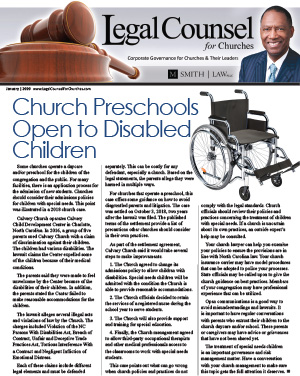Deciding to merge with another organization may be one of the most difficult decisions a board will face. This can be an emotional moment for a board. This is especially so for a church that is steeped in history and tradition. Here are some important consideration for churches on the issue of combining their congregations and ministries.
A church board, management and congregation may consider a merger with another church for several reasons.
First, the church may believe it does not have the scale or wherewithal to fulfill its mission. The nonprofit sector is crowded with players who share similar missions. Some communities have an abundance of churches. As the economy changes and evolves, churches are bound to compete for limited community resources. The rationing of resources can leave churches starved for fuel to grow and reach sustainable scale. When this occurs, church boards may decide that a change in direction is necessary.
Secondly, the church may suffer from financial challenges that make its future less certain. The financial success of any organization varies with the economy. The effects of populations, demographics, market disruptions and competitive forces mean the landscape continually shifts. If a church’s financial performance heads towards a persistent negative trend, the board may reach the conclusion that the inevitable result is not desirable.
Finally, the church may feel an expansion of its mission through another organization offers new opportunities to reach a larger audience. For many markets and business sectors, the size of the balance sheet matters. Scale can provide efficiency, market influence and reach. The combination of churches with complementary cultures can be beneficial for both entities.
There are benefits to a church merger. The surviving church may be stronger with more assets, volunteers and money to invest in the community. The mission of the church may get a boost to fulfill its purpose.
There can be drawbacks to a church merger. Some church members may feel a loss of identity. Church affiliation is often a strong emotional connection. The new larger church may feel less familiar. Church leaders should be mindful to be transparent and open with all communications to make everyone feel welcome.
From a governance standpoint, church leaders must exercise effective due diligence in a merger process. Asking the right questions is often the key to avoiding unexpected surprises. Each church leadership should have a complete inventory of outstanding issues, commitments and impending risks to be resolved beforehand.
If a church board wishes to explore this option, a task force may be appointed to conduct a thorough investigation. The task force may survey several churches for likely merger allies. The task force may list the functions where gaps exist in the church and how another church could fill the needs. The goal should be to identify other churches that complement the organization and help build a more capable ministry.
The Board should consider employing the assistance of professional advisors to help guide the process. Such professionals may include legal counsel, accounting and a strategic planning facilitator. Not all professionals will be needed at the same time. Their services will likely overlap.
A church merger offers new opportunities to expand the ministry and fulfill its objectives. A successful merger can be a win-win for each church. Plan ahead to ensure the merger is successful.

